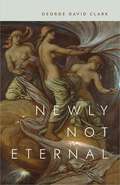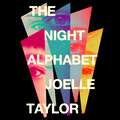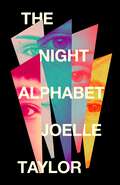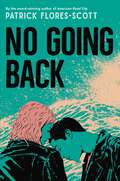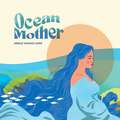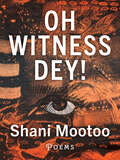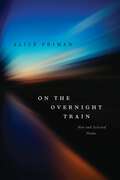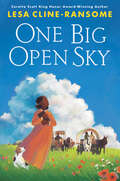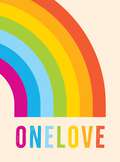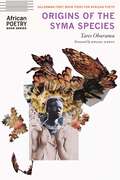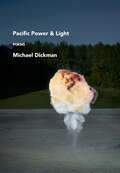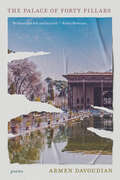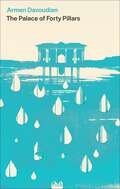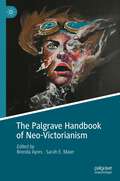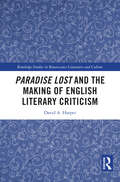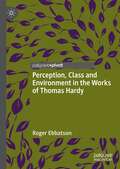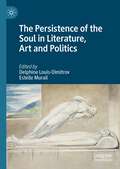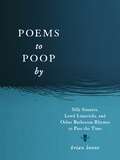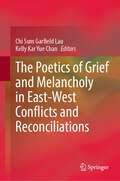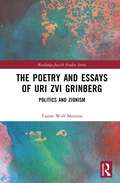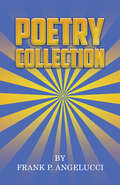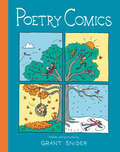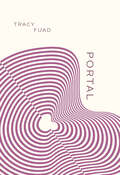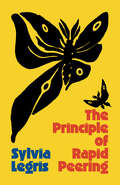- Table View
- List View
Newly Not Eternal
by George David ClarkEqual parts elegy and ode, Newly Not Eternal explores the startling suffering and sentiment implicit in human mortality. At the heart of this collection, a son has died on the cusp of his first breath, but the book’s stakes are larger and more universal than a single, silent, foreshortened life. Ranging from personal lyrics to monologues in persona, from triolets to a modified crown of sonnets, from surreal fantasy to natural landscape, George David Clark’s poems sing of the brutality of time and the beauty that transcends it.
The Night Alphabet: the electrifying debut novel from the award-winning poet
by Joelle TaylorComposed of interconnecting stories, The Night Alphabet is a mesmerising blend of memoir, fiction and poetry, from one of the most talented literary stylists writing today.The tattoo was a reclamation, a flag we mounted in the centre of our own landscape.A woman walks into a tattoo parlour. But this is no ordinary woman, and this is Hackney in 2233. Jones' body is covered in tattoos but she wants to add one final inking to her gallery - a thin line of ink mixed with blood that connects her body art together, creating a unique map.As the two artists set to work, Jones tells them the story behind each tattoo. As Jones is no ordinary woman, these are no ordinary stories: each one represents a doorway to a life Jones fell into, a 'remembering'. Some of these lives were in the past, others in the future, some are sideways, but each of them connects Jones to the two tattoo artists in some way, though they are unaware of it.We visit the dystopian cities of the Quiet Men, the coal mines of 19th century Lancashire, join a gang of vigilante sex workers, enter the world of an INCEL murderer, haunt the old Maryville gay bar, and uncover plans to genetically modify female children. Each of the stories brings us closer to Jones' truth, and how her life is intricately interwoven with that of the women tattooing her body.Set across geographies and timespans, The Night Alphabet is a dazzlingly bold and original work, a deep investigation into human nature and violence against women.'Joelle Taylor has a Midas touch with words' Diana Souhami(P)2024 Quercus Editions Limited
The Night Alphabet: the electrifying debut novel from the award-winning poet
by Joelle Taylor'Joelle Taylor has a Midas touch with words' Diana SouhamiA Cosmo best books to look forward to in 2024 pick 'A glorious jewel of a novel' Sophie Ward'Exhilarating, profoundly beautiful and exquisitely written' Salena Godden'A mesmerising debut from one of the most talented literary stylists writing today' The Bookseller'Hugely imaginative' Marie Claire (Best New Books, 2024)---------------------------------------------------------------------------------The tattoo was a reclamation, a flag we mounted in the centre of our own landscape.A woman walks into a tattoo parlour. But this is no ordinary woman, and this is Hackney in 2233. Jones' body is covered in tattoos but she wants to add one final inking to her gallery - a thin line of ink mixed with blood that connects her body art together, creating a unique map.As the two artists set to work, Jones tells them the story behind each tattoo. As Jones is no ordinary woman, these are no ordinary stories: each one represents a doorway to a life Jones fell into, a 'remembering'. Some of these lives were in the past, others in the future, some are sideways, but each of them connects Jones to the two tattoo artists in some way, though they are unaware of it.We visit the dystopian cities of the Quiet Men, the coal mines of 19th century Lancashire, join a gang of vigilante sex workers, enter the world of an INCEL murderer, haunt the old Maryville gay bar, and uncover plans to genetically modify female children. Each of the stories brings us closer to Jones' truth, and how her life is intricately interwoven with that of the women tattooing her body.Set across geographies and timespans, The Night Alphabet is a dazzlingly bold and original work, a deep investigation into human nature and violence against women.
No Going Back
by Patrick Flores-ScottA Junior Library Guild Gold Standard Selection"Powerful…. The excellent pacing and heart-wrenching exploration of redemption will sweep readers up." —Kirkus Reviews"[A] page-turning, highly readable story." —Booklist"Time-stamped chapters add urgency, intensity, and excitement as the thrilling plot progresses, making for a page-turning story about forgiveness and personal evolution." —Publishers WeeklyIn this tour de force about one teen&’s quest for redemption from the award-winning author of American Road Trip, Antonio is determined to make amends to the people he hurt most—even if it means breaking the terms of his early release from juvenile detention. It&’s Friday morning, and seventeen-year-old Antonio Sullivan is on the verge of earning his early release from Zephyr Woods Youth Detention Center. Having been incarcerated for the last year and a half for a crime he didn&’t directly commit, he&’s now dedicating himself to his education and his sobriety program. What&’s more, Antonio is driven by a deep need to make amends to the two people he hurt the most: his mom and his lifelong best friend, Maya. The conditions of his early release are clear—Antonio can&’t have any contact with his father or miss his first meeting with his parole officer Monday morning. But a lot can happen between Friday and Monday, especially when the odds are against you. Told through time-stamped chapters that race at a fever pitch over the course of a weekend, this absorbing coming-of-age novel explores what it means to right past wrongs in the face of adversity.PRAISE FOR NO GOING BACK "Fast-paced, poignant, and poetic . . . This is a book of unexpected hope." —Sondra Soderborg, author of Sky Ropes "A deep look into the heart of being misunderstood, told with prose you just can't fake. With honest voices, a flow of poetry, and a satisfying conclusion, this book is a gift with a purpose, the kind you hand to a reader that both wants and needs it." —Sean Beaudoin, author of Welcome Thieves and Wise Young Fool "A gripping and heart-wrenching novel about family, friendship and second chances—will keep you on the edge of your seat until the very end." —Betty Culley, author of Three Things I Know are True and The Name She Gave Me "Poetry, resilience, unflinching honesty, a steady undercurrent of hope, plus a wild adventure with a ticking clock, this book packs it all in for a three-day turbulent ride that's full of heart." —Kristin Bartley Lenz, author of The Art of Holding On and Letting Go "A powerful story of the push and pull between doing what&’s right and being there for the people we love." —Katherine Higgs-Coulthard, author of Junkyard Dogs and Hanging with My Peeps "Patrick Flores-Scott delivers a beautiful exploration of familial love, the idea of healthy friendships, and the long-term impacts of trauma." —Rita Shah, author of The Meaning of Rehabilitation and Its Impact on Parole
Ocean Mother
by Arielle LoweOcean Mother tells the story of a young woman’s decision to heal herself, her family, and her home. The poet gives voice to her experience as a CHamoru girl raised in the Pacific Island of Guåhan (Guam), located in Micronesia. Weaving together narratives of family, environment, Indigenous identity, decolonial love, and her CHamoru culture, the poet goes on a journey inward and overseas. She explores the relationships between culture and identity, colonialism and inherited trauma, sense of place and generational healing.
Oh Witness Dey!
by Shani MootooTwo-timer I am, infatuated With the country in which I love Yearning in corners, around bends For the one I grew up in Shani Mootoo' s great-great-grandparents were brought to Trinidad as indentured labourers by the British. There is no record of where they were from in India or whether it was kidnapping, trickery, or false promises of wealth that took them to the Caribbean. In Oh Witness Dey! Mootoo expands the question of origins, from ancestry percentages and journey narratives, through memory, story, and lyric fragments. These vibrant poems transcend the tropes of colonial violence through saints and spices, rebellion and joy, to reimagine tensions and solidarities among various diasporas. They circumvent traditional conventions of style to find new routes toward understanding. They invite the reader to witness history, displacements and the legacies of our inheritance.
On the Overnight Train: New and Selected Poems
by Alice FrimanOn the Overnight Train collects a lifetime of thought and writing by Alice Friman, presenting poems of passion and permission, gravity and humor, alongside a great deal of truth telling peppered with the salt of invention. Here even the dead clink glasses and remain as alive and present as ever. Here the old stories abide and the new ones, written at the tail end of a life, face the inevitable with clear-eyed candor, wit, and grace. As Stephen Corey writes in his introduction, “Friman’s poetry is still kicking ass and breaking hearts as she steams toward ninety,” and On the Overnight Train captures the world of a distinctive poet whose work is vivid, understandable, and emotionally honest.
One Big Open Sky
by Lesa Cline-RansomeThree women narrate a perilous wagon journey westward that could set them free—or cost them everything they have—in this intergenerational verse novel that explores the history of the Black homesteader movement. <p><p> 1879, Mississippi. Young dreamer Lettie may have her head in the stars, but her body is on a covered wagon heading westward. Her father, Thomas, promises that Nebraska will be everything the family needs: an opportunity to claim the independence they’ve strived for over generations on their very own plot of land. <p><p> But Thomas’ hopes—and mouth—are bigger than his ability to follow through. With few supplies and even less money, the only thing that feels certain is danger. <p><p> Right after the war ended/and we were free/we believed/all of us did/that couldn’t nothing hurt us/the way master had when we were slaves/Couldn’t no one tell us/how to live/how to die. <p><p> Lettie, her mother, Sylvia, and young teacher Philomena are free from slavery—but bound by poverty, access to opportunity, and patriarchal social structures. Will these women survive the hardships of their journey? And as Thomas’ desire for control overpowers his common sense, will they truly be free once they get there? <p><p> Coretta Scott King Honor-winning author Lesa Cline-Ransome’s striking verse masterfully portrays an underrepresented historical era. Tackling powerful themes of autonomy and Black self-emancipation, Cline-Ransome offers readers an intimate look into the lives of three women and an expansive portrait of generations striving for their promised freedom.
One Love: Romantic Quotes for the LGBTQ+ Community
by Summersale PublishersLove is for everyone and should be celebrated. It is a universal experience that transcends boundaries, gender and sexuality. Show your special someone how important they are to you with this diverse selection of thoughtful words. Be proud of your love and love with everything you have, because love is the most powerful thing in the world.
Origins of the Syma Species (African Poetry Book)
by Tares OburumuWinner of the Sillerman First Book Prize for African Poets Winner of the Sillerman First Book Prize for African Poets, Tares Oburumu&’s collection is a brief history of where he came from: Syma, a neglected oil-producing region of Nigeria. After growing up with a single mother in the creek- and brook-marked region, and himself now a single parent, Oburumu examines single parenthood and how love defines family circles. Mixing music, religion, and political critique, Origins of the Syma Species evokes pasts and futures. Inspired by the relative chaos found in the origin of things, Oburumu&’s poems explore how the beauty of chaos binds us to our ancestral roots. In his poems Oburumu identifies with anyone who is a single parent or is dealing with the lonely trauma of a broken home. His poems instill hopefulness in a world that has the means to throw many into poverty and agony.
Outdoor Farm, Indoor Farm
by Lindsay H. MetcalfDiscover how both outdoor and indoor farms sustainably grow the food we eat throughout the year in this vibrant, rhyming picture book.Outdoor farm, tractors toil.Indoor farm,zero soil.With energetic, enchanting verse and sunshiny, colorful illustrations, discover how the food you eat is grown both outside—and inside! Join two children as they explore the inner workings of an outdoor farm and an indoor farm. You&’ll see how a variety of amazing machinery like tractors and drones along with innovative farming techniques yield the wonderful food we all love to enjoy.
Pacific Power & Light: Poems
by Michael DickmanThe award-winning poet returns to his homeplace in the Pacific Northwest, where the neighborhood simmers with the chemical presence of human trouble and sparks of beauty coexist with danger.This image-driven, sound-driven collection carries us to the working-class Portland neighborhood of Lents, where Dickman was raised by a single mother. Here, as a skateboarding boy practices his kickflip on the street, enlightenment simmers under the surface of both the natural world and the human constructions that threaten it. The rivers shrinking to a trickle, the unaddressed crisis of homelessness, the drug use in a local park: these run side by side with the efforts and structures of families, created mostly by working mothers, with their jumbled bottomless purses and full-time jobs; Dickman&’s own mother worked at the power company of the title, PP&L. His exquisite, ultrareal narratives take us down through these layers, illuminating the way we&’ve treated and should treat one another, seeking integrity and understanding in the midst of a broken world.
The Palace of Forty Pillars
by Armen DavoudianA San Francisco Chronicle and LitHub Best Book of Spring A Most Anticipated Book of the Season at The Rumpus, Publishers Weekly, and Autostraddle “Brilliant and deft and heartfelt."—Richie Hofmann Wry, tender, and formally innovative, Armen Davoudian’s debut poetry collection, The Palace of Forty Pillars, tells the story of a self estranged from the world around him as a gay adolescent, an Armenian in Iran, and an immigrant in America. It is a story darkened by the long shadow of global tragedies—the Armenian genocide, war in the Middle East, the specter of homophobia. With masterful attention to rhyme and meter, these poems also carefully witness the most intimate encounters: the awkward distance between mother and son getting ready in the morning, the delicate balance of power between lovers, a tense exchange with the morality police in Iran. In Isfahan, Iran, the eponymous palace has only twenty pillars—but, reflected in its courtyard pool, they become forty. This is the gamble of Davoudian’s magical, ruminative poems: to recreate, in art’s reflection, a home for the speaker, who is unable to return to it in life.
The Palace of Forty Pillars
by Armen Davoudian'In this formally radical debut, Armen Davoudian shows how rhyme enacts longing for a homeland left behind; how meter sings to a lost beloved; and how a combination of the two can map a self - or idea of the self - relinquished so that a new life, and all the happiness it deserves, can take shape' Paul Tran'Marks the arrival of a notable new voice . . . The Palace of Forty Pillars is a moving book as well as an elegant one; its central preoccupation with the theme of belonging speaks memorably to one of the most urgent questions of our time' Andrew MotionWry, tender, and formally innovative, Armen Davoudian's debut poetry collection, The Palace of Forty Pillars, tells the story of a self estranged from the world around him as a gay adolescent, an Armenian in Iran, and an immigrant in America. It is a story darkened by the long shadow of global tragedies - the Armenian genocide, war in the Middle East, the specter of homophobia. With masterful attention to rhyme and meter, these poems also carefully witness the most intimate encounters: the awkward distance between mother and son getting ready in the morning, the delicate balance of power between lovers, a tense exchange with the morality police in Iran.In Isfahan, Iran, the eponymous palace has only twenty pillars - but, reflected in its courtyard pool, they become forty. This is the gamble of Davoudian's magical, ruminative poems: to recreate, in art's reflection, a home for the speaker, who is unable to return to it in life.
The Palgrave Handbook of Neo-Victorianism
by Brenda Ayres Sarah E. MaierThis handbook offers analysis of diverse genres and media of neo-Victorianism, including film and television adaptations of Victorian texts, authors’ life stories, graphic novels, and contemporary fiction set in the nineteenth century. Contextualized by Sarah E Maier and Brenda Ayres in a comprehensive introduction, the collection describes current trends in neo-Victorian scholarship of novels, film, theatre, crime, empire/postcolonialism, Gothic, materiality, religion and science, amongst others. A variety of scholars from around the world contribute to this volume by applying an assortment of theoretical approaches and interdisciplinary focus in their critique of a wide range of narratives—from early neo-Victorian texts such as A. S. Byatt’s Possession (1963) and Jean Rhys’ Wide Sargasso Sea (1966) to recent steampunk, from musical theatre to slumming, and from The Alienist to queerness—in their investigation of how this fiction reconstructs the past, informed by and reinforming the present.
Paradise Lost and the Making of English Literary Criticism (Routledge Studies in Renaissance Literature and Culture)
by David A. HarperParadise Lost and the Making of English Literary Criticism identifies the early reception of Paradise Lost as a site of contest over the place of literature in political and religious controversy. Milton’s earliest readers and critics (Dryden, Addison, Dennis, Hume, and Bentley) confronted a poem and author at odds with prevailing culture and the revanchist conservatism of the restored monarchy. Grappling with the epic required navigating Milton’s reputation as a “fanatick” who had called in print for Charles I’s execution, inveighed openly against monarchy on the eve of Charles II’s return, and held heretical views on the trinity, baptism, and divorce. Harper argues that foundational figures in English literary criticism rose to this challenge by innovating new ways of reading: producing creative (and subversive) rewritings of Paradise Lost, articulating new theories of the sublime, explaining the poem in the first substantial body of annotations for an English vernacular text, and by pioneering early forms of textual criticism and editing.
Perception, Class and Environment in the Works of Thomas Hardy
by Roger EbbatsonThis book examines Thomas Hardy’s writing in both prose and poetry, focusing on issues of perception, ‘being’, class and environment. It illustrates the ways in which Hardy represents a social world which serves as a ‘horizon’ for the individual and explores the dialectic between the perceptible world and human consciousness. Ebbatson demonstrates how, in Hardy’s oeuvre, modern life becomes alienated from its roots in rural life – individual freedom is achieved in works like Tess of the d'Urbervilles, Jude the Obscure or The Woodlanders at the cost of personal insecurity and a deepening sense of homelessness. However, this development occurs against the marginalisation of dialect forms of speech. This book also explores how Hardy’s impressionist vision serves to undermine the prevailing conventions of plot structure.
The Persistence of the Soul in Literature, Art and Politics
by Delphine Louis-Dimitrov Estelle MurailThis book analyses the evolution of literary and artistic representations of the soul, exploring its development through different time periods. The volume combines literary, aesthetic, ethical, and political considerations of the soul in texts and works of art from the seventeenth to the twenty-first centuries, spanning cultures and schools of thought. Drawing on philosophical, religious and psychological theories of the soul, it emphasizes the far-reaching and enduring epistemological function of the concept in literature, art and politics. The authors argue that the concept of the soul has shaped the understanding of human life and persistently irrigated cultural productions. They show how the concept of soul was explored and redefined by writers and artists, remaining relevant even as it became removed from its ancient or Christian origins.
Poems to Poop by: Silly Sonnets, Lewd Limericks, and Other Bathroom Rhymes to Pass the Time
by Brian BooneCheeky verse for loads of bathroom fun!“Brilliant from one end to the next!” —T. P. Eliot, “The Waste Land”“A literary laxative for our times!” —Elizabeth Barrett Browning, “To Flush, My Toilet”Poems to Poop by will relax and entertain you and your bathroom guests whenever nature calls. Find humor and relief in this witty, toilet-friendly treasury featuring hundreds of outhouse odes, poo haikus, Insta-poems, and joyfully silly rhymes to pass the time. Keep this colon-clearing collection toilet-side or take it with you wherever you go!- Treat yourself to a poetic poop break anytime you need it- Enjoy updated classics like “Tinkle, Tinkle, Little Star,” “One Flush, Two Flush,” and “Stopping to Pee on a Snowy Evening”- Indulge your love of bathroom humor with verse that’s sure to move you
The Poetics of Grief and Melancholy in East-West Conflicts and Reconciliations
by Chi Sum Garfield Lau Kelly Kar Yue ChanThis book is a collection of academic essays that examines the representation, esthetics and dichotomy of the notions of grief and melancholy in East–West exchanges and cultural dialogues. It explores the topic in the dimensions of individual behaviors under specific social norms and cultural products such as literature, film and any other forms of arts/genres, etc.In his 1917 work Mourning and Melancholia (Trauer und Melancholie), Sigmund Freud connected the grief of loss with melancholic emotions which may give rise to acts of mourning. He suggested that “[i]n mourning it is the world which has become poor and empty; in melancholia it is the ego itself” (Freud, 1917: 246). Inspired by Freud’s stance and with the goal of providing up-to-date intellectual resources for academics, researchers and students with ardent interests in the varying exemplifications of grief and melancholy in Sino-Western contexts, the book serves more than a discussion over the pragmatic and ritualistic connections of grief and melancholy in relation to the inner self and the external world. It aims at the pursuit of a contemporary theorization of grief and melancholy beyond its modern limits.
The Poetry and Essays of Uri Zvi Grinberg: Politics and Zionism (ISSN)
by Tamar Wolf-MonzonThis book focuses on the complex network of relationships between the poet Uri Zvi Grinberg and the Labor Movement in Mandate Palestine from 1923 to 1937.Making use of letters found in the Uri Zvi Grinberg Archive at the National Library of Israel (NLI), the author reconstructs the characteristics of Grinberg’s pioneer readership, attesting to their special relationship with his poetry. In the 1920s, it is argued, they considered Grinberg’s poetry an authentic expression of their complex spiritual world and especially of the reality of their lives. On his side, Grinberg accepted the pioneering ethos as the ideological basis of his works, becoming an outstanding poet of the Labor Movement. The chapters of this book track the various phases of Grinberg’s life and poetry, from his emigration to Palestine through to the 1930s, when he joined the Revisionist Movement and became increasingly ostracized from the Labor Movement. The story of Grinberg’s relations with the pioneers was emotionally charged—a mixture of enchantment and rejection, spiritual closeness and repulsion. Ultimately, this book analyzes the intensity of this connection and its many contradictory layers.This book will interest researchers in a range of fields, including Hebrew poetry and reception theory, as well as anyone interested in Israeli studies and the history of the Labor Movement in Palestine.
Poetry Collection
by Frank P. AngelucciDelve into a poetic tapestry that weaves the myriad facets of life's journey. This collection resonates with human emotions, offering solace to souls seeking comfort and connection. Inspired by everyday moments and the indelible impact of loved ones – both present and departed – these verses are a testament to the beauty and complexity of existence. Embark on a literary voyage, and may you find as much joy in these pages as I found in penning them.
Poetry Comics
by Grant Snider“A poetry-filled graphic novel that is powerful in its simplicity.” ―Publishers Weekly, Starred Review "Personal but personable, too, with glints of quiet humor.” ―Kirkus Reviews, Starred Review “Poetry Comics is . . . a sensorial experience that taps into what it means to be human and leaves you inspired to explore, discover, create, and connect.” —Aron Nels Steinke, Eisner Award-winning cartoonist From the creator of Incidental Comics, Grant Snider, comes a fun and imaginative book that combines poetry and comics in a whole new way. Perfect for poetry lovers and reluctant readers alike.From the cloud-gazing hours of early spring to the lost bicycles of late autumn, Grant Snider’s brilliantly illustrated Poetry Comics will take you climbing, floating, swimming, and tumbling through all the year’s ups, downs, and in-betweens. He proves that absolutely everything, momentous or minuscule, is worthy of attention, whether snail shells, building blocks, the lamented late bus, or the rare joy of unscuffed shoes. These poems explore everything you never thought to write a poem about, and they’re so fun to read you’ll want to write one yourself. Not to worry, there’s a poem for that, too!FOR COMIC BOOK FANS: These poems for kids are brightly illustrated in graphic novel-style panels, adding a delightful new element to approaching poetry. Perfect for visually oriented readers and young people who already love comics, cartoons, and graphic novels.EXCITING NEW APPROACH TO POETRY: Funny, instructive, and thoroughly engaging, this poem book is a perfect addition to classroom libraries and poetry curricula. POEMS FOR EVERY SEASON: With sections for winter, spring, summer, and fall, this poetry book offers teachers and kids lots to enjoy and share all year round. SPARK A LOVE OF POETRY AND ART: Perfect for classroom writing and drawing prompts, this book will inspire readers of all ages to make and share poetry comics of their own!Perfect for:Young readers of comics and graphic novelsAspiring poets, writers, and cartoonistsParents and educators seeking a fun and engaging way to introduce kids to poetryReading and sharing during Poetry MonthReaders looking for contemporary additions to classic children's poetry like Shel Silverstein's Where the Sidewalk Ends, Falling Up, and A Light in the AtticFans of Mary Oliver looking to share an equally contemplative, nature-loving poet with kidsFans of Grant Snider books, including Nothing Ever Happens on a Gray Day, What Color Is Night?, What Sound Is Morning?, One Boy Watching, and There Is a Rainbow
PORTAL (Phoenix Poets)
by Tracy FuadA poetry collection exploring inheritance and reproduction through the lenses of parenthood, etymology, postcoloniality, and climate anxiety. Tracy Fuad’s second collection of poems, PORTAL, probes the fraught experience of bringing a new life into a world that is both lush and filled with gloom. A baby is born in a brutalist building; the planet shrinks under the new logic of contagion; roses washed up from a shipwreck centuries ago are blooming up and down the cape. PORTAL documents a life that is mediated, even at its most intimate moments, by flattening interfaces of technology and in which language—and even intelligence—is no longer produced only by humans. The voices here are stalked by eco-grief and loneliness, but they also brim with song and ecstasy, reveling in the strangeness of contemporary life while grieving losses that cannot be restored. Through Fuad’s frank, honest poetry, PORTAL vibrates with pleasure and dread. Peeling back the surfaces of words to reveal their etymologies, Fuad embraces playfulness through her formal range, engaging styles from the tersely lineated to the essayistic as she intertwines topics of replication, reproduction, technology, language, history, and biology.
The Principle of Rapid Peering
by Sylvia LegrisA lyrical guide through Saskatchewan’s Aspen Parkland by a poet whose work is “fizzing with ecological intellect” (Times Literary Supplement). Self-seeding wind is a wind of ever-replenishing breath. —from “The Walk, or The Principle of Rapid Peering” The title of Sylvia Legris’ melopoeic collection The Principle of Rapid Peering comes from a phrase the nineteenth-century ornithologist and field biologist Joseph Grinnell used to describe the feeding behavior of certain birds. Rather than waiting passively for food to approach them, these birds live in a continuous mode of “rapid peering.” Legris explores this rich theme of active observation through a spray of poems that together form a kind of almanac or naturalist’s notebook in verse. Here is “where nature converges with words,” as the poet walks through prairie habitats near her home in Saskatchewan, through lawless chronologies and mellifluous strophes of strobili and solstice. Moths appear frequently, as do birds and plants and larvae, all meticulously observed and documented with an oblique sense of the pandemic marking the seasons. Elements of weather, ornithology, entomology, and anatomy feed her condensed, inflective lines, making the heart bloom and the intellect dance.
